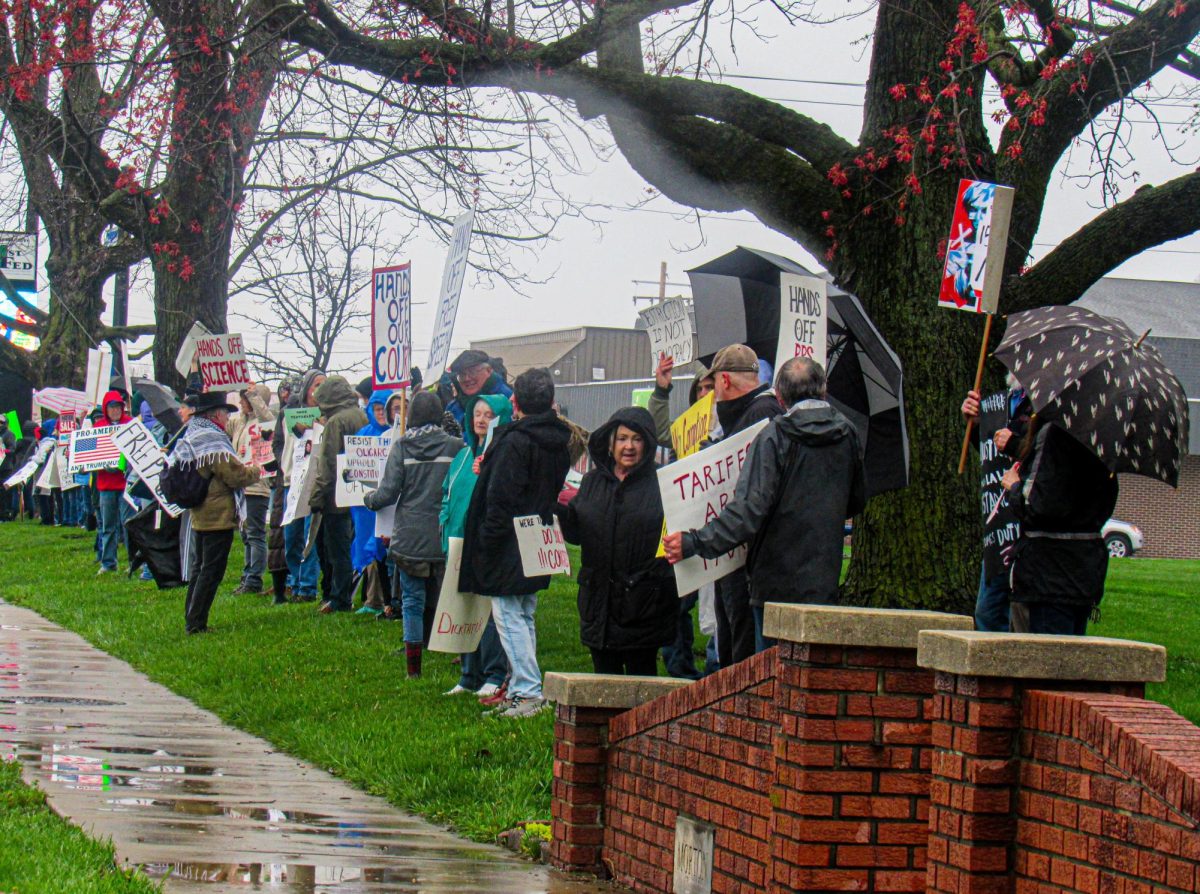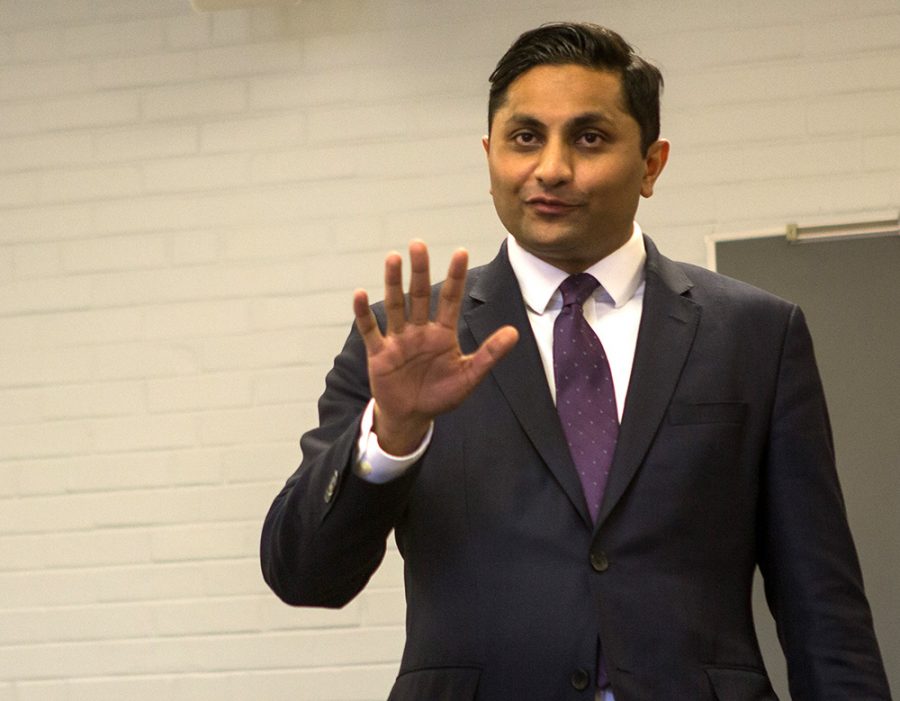Pawar proposes “new deal” for Illinois
Chicago Alderman Amaya Pawar, who recently announced his bid for democratic nomination for governor, spoke to a room of members of the Eastern community Saturday afternoon.
February 27, 2017
Inspired by the determination of former president Franklin D. Roosevelt and equipped with a vision, Chicago alderman Ameya Pawar, from the 47th ward, spoke to students, faculty and community members about his plans for the future of Illinois on Saturday.
Pawar recently announced his bid to run for the Democratic nomination for Governor in 2018.
He came to Eastern to share his platform, which he called the “new deal” for Illinois.
Consisting of four key points, he said his vision for Illinois is based on equity, fairness and progressive tax reform.
“I’m tired of the state of Illinois fighting over scraps,” Pawar said. “I believe government is aspirational as well as public service.”
The first point in his plan is changing the public education funding formula currently in place.
He said every community not based on wealth experiences some sort of inequity in education because of the reliance on property taxes.
“So, if you were in a community that has a wealthier tax base, then you can spend what you need to spend on schools, but everyone else in the state has to figure out how to pay for schools without taxing everyone,” Pawar said.
What ends up happening, he said, is people have massive inequities, where a few suburbs outside the city can spend $25,000 a year for students and most spend half of that.
Pawar’s second plan was creating universal childcare in the state by offering a government subsidy for families who make under $75,000 a year.
“If we say we have family values, then we actually have to value families,” he said. “And that means we shouldn’t make it more difficult for people to go to work than to stay home to raise a child.”
Pawar said childcare has gotten so expensive over the last decade that it is basically the same as paying for a child to go to college while they are still in diapers.
This is a gender equity issue, he said, as it is mostly women who are forced to leave their jobs once the child is born.
“If you make the decision to do it, great,” Pawar said. “But if you are forced to leave the workplace because it is cheaper for you to stay at home than to go to work and you believe in rugged individualism… well, you’re taking people out of the workplace early.”
Pawar said his idea puts more money back in people’s pockets by offering a state investment on the front end and leaving the opportunity for families to set money aside for things like a down payment on a house.
His third point focused on creating more jobs in Illinois and establishing a capital bill.
Pawar said it is time to invest in communities in an equitable way by investing in universities and public education.
“This is about making sure communities are stable, because if you invest in the things that people want to use, those are the things that drive jobs, those are the things that create stability,” Pawar said.
He said assets such as Eastern should not be seen as a drain or a liability to the government.
Finally, Pawar proposed criminal justice reform and said people should not be going to jail if they have mental health issues.
People should not be tagged with a scarlet letter by making a simple mistake, such as carrying a small amount of narcotics, he said.
“In order to do these things we have to make sure the wealthy pay their fair share,” Pawar said, introducing his progressive tax bill. “Wealth is fine. I don’t envy wealth, I don’t hate wealth, I think that people who are wealthy are not all bad people, but I think fundamentally as a society we have to stop worshiping wealth.”
He asked audience members to think about what it means to propose a progressive tax.
He said beginning conversations about it will bring the state one step closer to solving its problems.
“If you go to work every day, if a majority of income comes from going to work, you are a working person. You have a tax system that makes it impossible for working people to get ahead,” Pawar said. “We need to resolve get that by having this conversation. Enough fighting for scraps and fighting with each other. (The) sooner we recognize this, the sooner we start solving problems.”
When asked about how he plans to support higher education such as how to fund universities and Monetary Award Program grants, Pawar said the progressive tax will help because it will lead to investing in universities.
He said the flat tax already established in Illinois is not working and Illinois is the fifth-largest economy in the country.
Though people talk about the state being broken, Pawar said this is not true.
“When I think about funding, it means recognizing that we need to have a progressive income tax,” Pawar said. “The more you make, the more you pay.”
Analicia Haynes can be reached at 581-2812 or achaynes@eiu.edu







![[THUMBNAIL EDITION] (From left to right) Head football coach Chris Wilkerson works with his son student assistant coach Peyton Wilkerson at football practice at O'Brien Field on the Eastern Illinois University campus on Thursday.](https://www.dailyeasternnews.com/wp-content/uploads/2025/04/FB_25_O-1-e1744234837107-1200x596.jpg)




![[Thumbnail Edition] Charleston High School sophomore Railyn Cox pitches the ball during Charleston's 8-7 win over Flora High School on Monday, March 31.](https://www.dailyeasternnews.com/wp-content/uploads/2025/04/SBHS_01_O-1-e1743982413843-1200x1023.jpg)



![[Thumbnail Edition] Senior Foward Macy McGlone, getsw the ball and gets the point during the first half of the game aginst Western Illinois University,, Eastern Illinois University Lost to Western Illinois University Thursday March 6 20205, 78-75 EIU lost making it the end of their season](https://www.dailyeasternnews.com/wp-content/uploads/2025/03/WBB_OVC_03_O-1-e1743361637111-1200x614.jpg)




















![[Thumbnail Edition] Eastern Illinois softball senior infielder Briana Gonzalez resetting in the batter's box after a pitch at Williams Field during Eastern’s first game against Southeast Missouri State as Eastern split the games as Eastern lost the first game 3-0 and won the second 8-5 on March 28.](https://www.dailyeasternnews.com/wp-content/uploads/2025/04/SBSEMO_11_O-1-e1743993806746-1200x692.jpg)
















![The Weeklings lead guitarist John Merjave [Left] and guitarist Bob Burger [Right] perform "I Am the Walrus" at The Weeklings Beatles Bash concert in the Dvorak Concert Hall on Saturday.](https://www.dailyeasternnews.com/wp-content/uploads/2025/03/WL_01_O-1200x900.jpg)
















